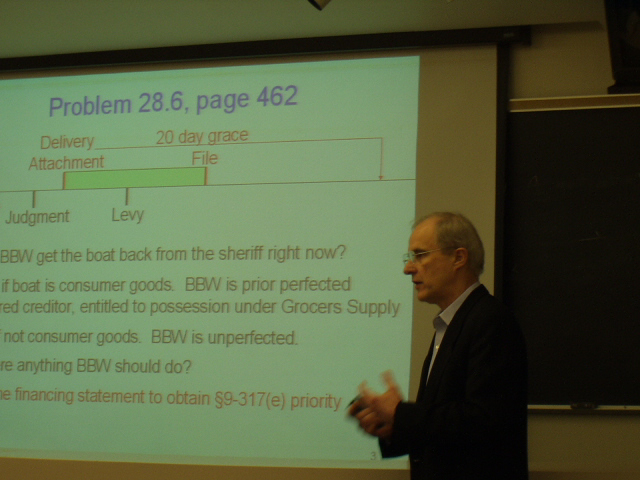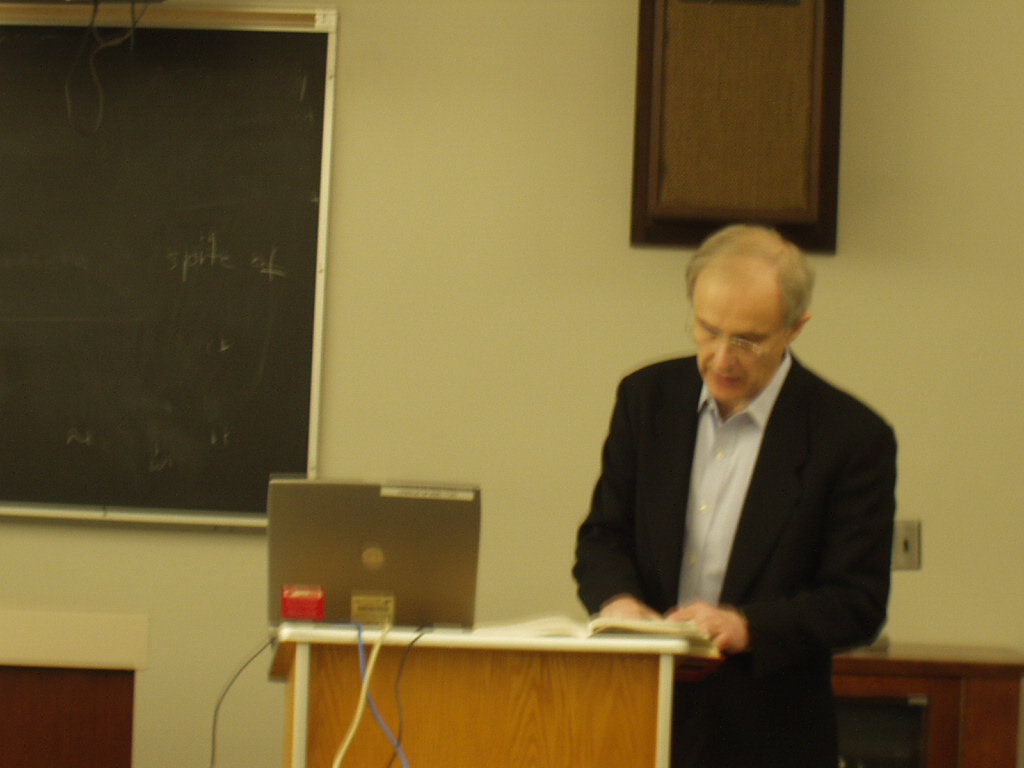 Prof. LoPucki's Class on Secured Credit
Prof. LoPucki's Class on Secured Credit
Lately Korean professors of law are required to pay a handsome amount of visiting scholar fee to their host law schools in the United States. The fee is like a charge for the services of free pass to the law library with huge legal literature, a small space of carrel, invitation to the faculty colloquia and attendance in the classes of interest.
The fee is allegedly over ten thousand dollars at the Ivy League schools of law in New England, and three to four couples of thousand dollars at the West Coast law schools. It might be a good trade because the host school has to provide the DS-2019 document so that the invitee may apply for J1/J2 visa with his family in addition to the above-mentioned services.
 So I had to think over how to get productive results from the sabbatical year in UCLA Law first time I sat in the law library. But it was not my case. It is because I was really happy when I was surrounded by a lot of legal books and journals in the law library and could attend the class of Prof. Lynn M. LoPucki on secured transactions as an auditor.
So I had to think over how to get productive results from the sabbatical year in UCLA Law first time I sat in the law library. But it was not my case. It is because I was really happy when I was surrounded by a lot of legal books and journals in the law library and could attend the class of Prof. Lynn M. LoPucki on secured transactions as an auditor.
Prof. LoPucki was introduced to the Korean people when Judge Y.S. Moon of the Seoul Central District Court described him as the best teacher not only in Harvard Law but also in the world. In the fall semester 2006, he taught the secured transactions at Harvard Law.
Prof. LoPucki makes it a rule to appear at the classroom five minutes earlier than the schedule in order to prepare audio/video devices for the class. Although he has recommended to the students his co-authored book "Secured Credit," he has insufficient time in explaining a big picture and key points via powerpoint slides. I felt ashamed by his sincere commitment to the lecture because I was usually late for the class on account of the "Academic Fifteen."
Prof. LoPucki seems to save his time during the class since I have never heard of jokes or other bullshit stories from his mouth. He has never called students' attendance, rather lets the students to mark their names at the classroom location diagram. As his class goes along with speed as notified in a syllabus in the beginning of the course, no one could catch up with his explanation without sufficient pre-study of the assignments. I guess that teachers feel like to have to refund a part of tuition fees if they cancel the class or fall short of the specified class hours.
 Prof. LoPucki's tile is the Security Pacific Bank Professor. It means that the bank has provided financial assistance to him for his research into such areas as bankruptcy law, secured transactions and information law including credit bureau activities. Surprisingly Prof. LoPucki has developed and established the Bankruptcy Research Database (BRD) by himself. BRD tracks 17 fields of data on over 700 bankruptcy cases filed by large, public companies since 1980. BRD is provided for free to scholars and practitioners. I asked a silly question. "How did you make it?" His answer reminded me of a proverb, "Slow and steady wins the race." Really his commitment to advance the bankruptcy regime of the United States drives him to wide open the window to the reality what was going on in the bankruptcy procedure.
Prof. LoPucki's tile is the Security Pacific Bank Professor. It means that the bank has provided financial assistance to him for his research into such areas as bankruptcy law, secured transactions and information law including credit bureau activities. Surprisingly Prof. LoPucki has developed and established the Bankruptcy Research Database (BRD) by himself. BRD tracks 17 fields of data on over 700 bankruptcy cases filed by large, public companies since 1980. BRD is provided for free to scholars and practitioners. I asked a silly question. "How did you make it?" His answer reminded me of a proverb, "Slow and steady wins the race." Really his commitment to advance the bankruptcy regime of the United States drives him to wide open the window to the reality what was going on in the bankruptcy procedure.
Really it was my fortune and privilege that he invited me to UCLA Law as a sponsor, shared his time to discuss particular topics of my interest, and gave me an insight to research law and practices on secured transactions. I have found some interesting and challenging concepts from his articles and books, for example, electronic filing systems of security interest and the Team Production Theory of bankruptcy reorganization.
At last, I was sitting in the right place to spend a sabbatical. I was delighted to secure plenty of legal resources preparing for several articles of my own under the constant intellectual stimulus from Prof. LoPucki.
In the Korean version
 So I had to think over how to get productive results from the sabbatical year in UCLA Law first time I sat in the law library. But it was not my case. It is because I was really happy when I was surrounded by a lot of legal books and journals in the law library and could attend the class of Prof. Lynn M. LoPucki on secured transactions as an auditor.
So I had to think over how to get productive results from the sabbatical year in UCLA Law first time I sat in the law library. But it was not my case. It is because I was really happy when I was surrounded by a lot of legal books and journals in the law library and could attend the class of Prof. Lynn M. LoPucki on secured transactions as an auditor. Prof. LoPucki's tile is the Security Pacific Bank Professor. It means that the bank has provided financial assistance to him for his research into such areas as bankruptcy law, secured transactions and information law including credit bureau activities. Surprisingly Prof. LoPucki has developed and established the Bankruptcy Research Database (BRD) by himself. BRD tracks 17 fields of data on over 700 bankruptcy cases filed by large, public companies since 1980. BRD is provided for free to scholars and practitioners. I asked a silly question. "How did you make it?" His answer reminded me of a proverb, "Slow and steady wins the race." Really his commitment to advance the bankruptcy regime of the United States drives him to wide open the window to the reality what was going on in the bankruptcy procedure.
Prof. LoPucki's tile is the Security Pacific Bank Professor. It means that the bank has provided financial assistance to him for his research into such areas as bankruptcy law, secured transactions and information law including credit bureau activities. Surprisingly Prof. LoPucki has developed and established the Bankruptcy Research Database (BRD) by himself. BRD tracks 17 fields of data on over 700 bankruptcy cases filed by large, public companies since 1980. BRD is provided for free to scholars and practitioners. I asked a silly question. "How did you make it?" His answer reminded me of a proverb, "Slow and steady wins the race." Really his commitment to advance the bankruptcy regime of the United States drives him to wide open the window to the reality what was going on in the bankruptcy procedure.